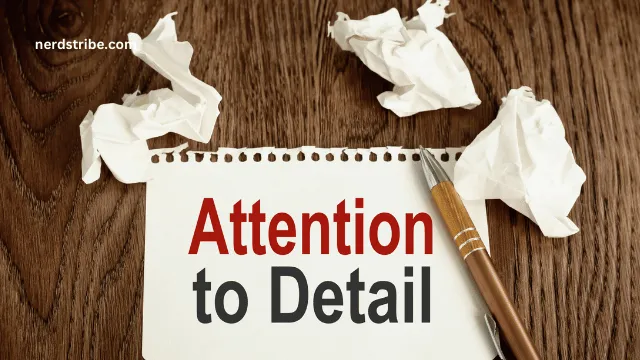“Attention to detail” is more than just a phrase—it’s a hallmark of quality and professionalism. Yet, using this term repeatedly can make your feedback or appreciation feel bland and predictable.
Whether you’re commending a colleague, crafting a resume, or recognizing someone’s effort, finding the right words to highlight their precision and care can make a significant impact.
Think about the power of language. Using nuanced alternatives to “attention to detail” can communicate not only your acknowledgment of someone’s skills but also your own sophistication as a communicator.
Words shape how we perceive and appreciate one another, and the right choice can deepen understanding and respect. This article introduces 10 creative alternatives to “attention to detail,” helping you express admiration more effectively.
From “meticulousness” to “conscientiousness,” these words offer varied tones and levels of formality, ensuring your compliments resonate with precision and meaning.

Contents
- 1 5. Craftsmanship
- 1.1 6. Discernment
- 1.2 7. Accuracy
- 1.3 8. Punctiliousness
- 1.4 9. Minutiae
- 1.5 10. Conscientiousness
- 1.6 Conclusion
- 1.7 FAQs
- 1.7.1 Why is “attention to detail” considered important?
- 1.7.2 When should I use alternatives to “attention to detail”?
- 1.7.3 Which alternative is best for formal settings?
- 1.7.4 Can these alternatives be used in resumes?
- 1.7.5 Are these phrases suitable for casual conversations?
- 1.7.6 How do I choose the right alternative?
1. Meticulousness
- Focus: This word highlights the careful and precise nature of someone’s work.
- Why It Matters: It underscores their ability to handle tasks with thoroughness and exactness.
- Example: “Your meticulousness in organizing the event made everything run flawlessly.”
2. Precision
- Focus: Precision emphasizes accuracy and an eye for details.
- Why It Matters: It celebrates someone’s ability to deliver error-free work consistently.
- Example: “Your precision in preparing the report ensures its credibility and impact.”
3. Thoroughness
- Focus: This word speaks to a person’s comprehensive and in-depth approach to tasks.
- Why It Matters: It shows that nothing is overlooked, enhancing the quality and completeness of their work.
- Example: “Your thoroughness in researching every angle of this project is commendable.”
4. Finesse
- Focus: Finesse implies a delicate touch and refined execution.
- Why It Matters: It highlights a person’s ability to navigate complexities with elegance and skill.
- Example: “You handled the negotiations with finesse, ensuring a win-win outcome.”
5. Craftsmanship
- Focus: Often associated with artistry, this word praises skillful and careful work.
- Why It Matters: It conveys a sense of pride and mastery in their output.
- Example: “Your craftsmanship in designing this presentation is truly outstanding.”

6. Discernment
- Focus: Discernment points to a person’s ability to perceive subtle details and make informed choices.
- Why It Matters: It reflects their judgment and keen observation skills.
- Example: “Your discernment in selecting the right tools for the job saved us time and resources.”
7. Accuracy
- Focus: Accuracy emphasizes freedom from errors and correctness.
- Why It Matters: It’s critical for tasks requiring high standards of reliability.
- Example: “The accuracy of your calculations played a key role in our success.”
8. Punctiliousness
- Focus: This term signifies strict adherence to rules, procedures, and details.
- Why It Matters: It’s ideal for appreciating work where compliance and order are crucial.
- Example: “Her punctiliousness ensured every regulation was followed to the letter.”
9. Minutiae
- Focus: Minutiae celebrates attention to the smallest details.
- Why It Matters: It conveys appreciation for their ability to focus on the finer points without losing sight of the bigger picture.
- Example: “Your attention to the minutiae of this campaign made it stand out.”
10. Conscientiousness
- Focus: This word highlights dedication, diligence, and care in completing tasks.
- Why It Matters: It showcases their commitment to quality and responsibility.
- Example: “Your conscientiousness throughout the project ensured its success.”
Conclusion
“Attention to detail” is an invaluable quality, but describing it in fresh, meaningful ways can elevate how we communicate. From meticulousness to conscientiousness, each alternative offers a nuanced way to acknowledge and celebrate someone’s dedication and skills.
Choosing the right word not only enhances your feedback but also deepens your appreciation for the person’s efforts. Remember: Words carry weight.
Expanding your vocabulary allows you to articulate your thoughts more effectively, leaving a lasting impression on your audience.
By selecting the most appropriate phrase, you can ensure your message resonates, whether you’re writing a performance review, giving a compliment, or highlighting your own strengths.
FAQs
Why is “attention to detail” considered important?
It’s essential for delivering high-quality work, minimizing errors, and maintaining professionalism in any setting.
When should I use alternatives to “attention to detail”?
Use alternatives when you want to vary your language or emphasize specific aspects of someone’s meticulousness.
Which alternative is best for formal settings?
“Meticulousness,” “conscientiousness,” and “precision” work well in professional contexts like reports or evaluations.
Can these alternatives be used in resumes?
Absolutely. Using words like “thoroughness” or “accuracy” can make your resume stand out by showcasing your skills effectively.
Are these phrases suitable for casual conversations?
Yes. Words like “finesse” and “craftsmanship” can add personality and depth to informal praise.
How do I choose the right alternative?
Consider the context, tone, and the specific quality you want to highlight. Match your choice to the situation and audience.








